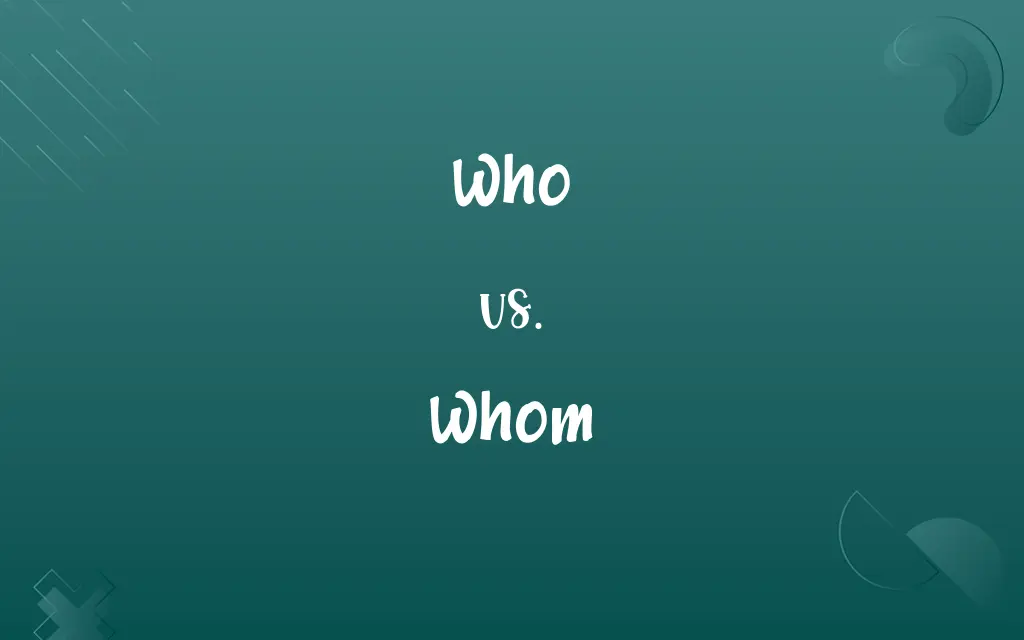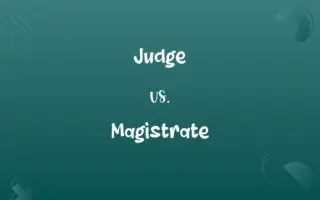Who vs. Whom: Know the Difference

By Shumaila Saeed || Updated on December 25, 2023
Who is used for subjects or subject complements; refers to people. Whom used for objects of verbs or prepositions; also refers to people.

Key Differences
Who is used when referring to the subject of a sentence. It's about identifying or questioning the identity of a person or people involved in an action. For example, "Who is going to the store?" In contrast, 'Whom' is used when referring to the object of a verb or preposition. It is often used in formal or written English and in questions or clauses. Example: "To whom did you give the book?"
Shumaila Saeed
Nov 17, 2023
'Who' can be replaced with pronouns like 'he' or 'she' in a sentence. If 'he' or 'she' fits, 'who' is typically the correct choice. Alternatively, 'Whom' aligns with 'him' or 'her'. If you can replace it with 'him' or 'her', 'whom' is likely correct. Example: "Whom did you see?" (You saw him/her).
Shumaila Saeed
Nov 17, 2023
Who commonly used in spoken English due to its simplicity and directness. People often use 'who' even in situations where 'whom' might be grammatically correct, especially in casual conversation. The use of 'whom' can add a level of formality or sophistication to speech or writing, though it's becoming less common in everyday language.
Shumaila Saeed
Nov 17, 2023
Who word is essential in forming questions about people's identities or roles. It's direct and engaging, prompting an answer about a person. 'Whom' is more likely to appear in written language, formal speeches, or structured interviews. It maintains a traditional grammatical structure.
Shumaila Saeed
Nov 17, 2023
Comparison Chart
ADVERTISEMENT
Function in a Sentence
Identifying or questioning identity
Referring to the object of action
Shumaila Saeed
Nov 17, 2023
Who and Whom Definitions
ADVERTISEMENT
ADVERTISEMENT
Who
(interrogative) What person or people; which person or people; asks for the identity of someone; used in a direct or indirect question.
Who is that? (direct question)
I don't know who it is. (indirect question)
Shumaila Saeed
Oct 19, 2023
Who
With antecedent as subject.
That's the man who works at the newsagent. (defining)
My sister, who works in the accounts department, just got promoted to manager. (non-defining)
Shumaila Saeed
Oct 19, 2023
Whom
As the object of a preposition.
To whom are you referring?
With whom were you talking?
Shumaila Saeed
Oct 19, 2023
Whom
(relative) Used to refer to a previously mentioned person or people.
That is the woman whom I spoke to earlier. (defining)
Mr Smith, whom we all know well, will be giving the speech. (non-defining)
He's a person with whom I work. (defining)
We have ten employees, half of whom are carpenters. (non-defining)
Shumaila Saeed
Oct 19, 2023
Whom
The person(s) whom; whomever.
To whom it may concern, all business of John Smith Ltd. has now been transferred to Floggitt & Runne.
Shumaila Saeed
Oct 19, 2023
Whom
The objective case of who. See Who.
And every grass that groweth upon rootShe shall eke know, and whom it will do boot.
Shumaila Saeed
Oct 19, 2023
Who
One; any; one.
As who should say, it were a very dangerous matter if a man in any point should be found wiser than his forefathers were.
Shumaila Saeed
Oct 19, 2023
Who
A United Nations agency to coordinate international health activities and to help governments improve health services
Shumaila Saeed
Oct 19, 2023
Repeatedly Asked Queries
What's the basic use of 'Who'?
Refers to the subject in a question or statement.
Shumaila Saeed
Nov 17, 2023
Is 'Whom' still commonly used?
Less so in casual speech, but still used in formal writing.
Shumaila Saeed
Nov 17, 2023
Can 'Who' and 'Whom' be used interchangeably?
No, they have distinct grammatical roles.
Shumaila Saeed
Nov 17, 2023
What is "Whom"?
"Whom" is a pronoun used for the object of a verb or preposition.
Shumaila Saeed
Nov 17, 2023
How to decide between 'Who' and 'Whom'?
Substitute 'he/she' for 'who' and 'him/her' for 'whom'.
Shumaila Saeed
Nov 17, 2023
When should I use "Whom"?
Use "whom" when it refers to the object receiving the action.
Shumaila Saeed
Nov 17, 2023
Can "Who" and "Whom" be used interchangeably?
No, they have specific grammatical roles and are not interchangeable.
Shumaila Saeed
Nov 17, 2023
When should I use 'Whom'?
When referring to the object of a verb or preposition.
Shumaila Saeed
Nov 17, 2023
When do I use "Who"?
Use "who" when it refers to the subject performing the action of the verb.
Shumaila Saeed
Nov 17, 2023
Is "Whom" still commonly used?
"Whom" is less common in casual speech but still used in formal writing.
Shumaila Saeed
Nov 17, 2023
Example of using "Whom"?
"To whom should I address this letter?" (Whom = object of the preposition "to").
Shumaila Saeed
Nov 17, 2023
Is "Whom" used in questions only?
No, it can also be used in statements, particularly in formal contexts.
Shumaila Saeed
Nov 17, 2023
Example of using "Who"?
"Who is going to the store?" (Who = subject going to the store).
Shumaila Saeed
Nov 17, 2023
What happens if I use "Who" instead of "Whom"?
It's a common mistake and often accepted in casual speech, but incorrect in formal writing.
Shumaila Saeed
Nov 17, 2023
Can I omit "Whom" in a sentence?
In informal speech, it's common to use "who" or omit "whom" entirely.
Shumaila Saeed
Nov 17, 2023
Can "Who" and "Whom" refer to objects?
Generally, they refer to people, not inanimate objects.
Shumaila Saeed
Nov 17, 2023
Are "Who" and "Whom" affected by number (singular/plural)?
No, they remain the same regardless of number.
Shumaila Saeed
Nov 17, 2023
How do I decide between "Who" and "Whom"?
If you can replace it with "he" or "she," use "who." If "him" or "her" fits, use "whom."
Shumaila Saeed
Nov 17, 2023
Is it ever correct to start a sentence with "Whom"?
Yes, in formal writing, particularly in questions.
Shumaila Saeed
Nov 17, 2023
Share this page
Link for your blog / website
HTML
Link to share via messenger
About Author
Written by
Shumaila SaeedShumaila Saeed, an expert content creator with 6 years of experience, specializes in distilling complex topics into easily digestible comparisons, shining a light on the nuances that both inform and educate readers with clarity and accuracy.









































































